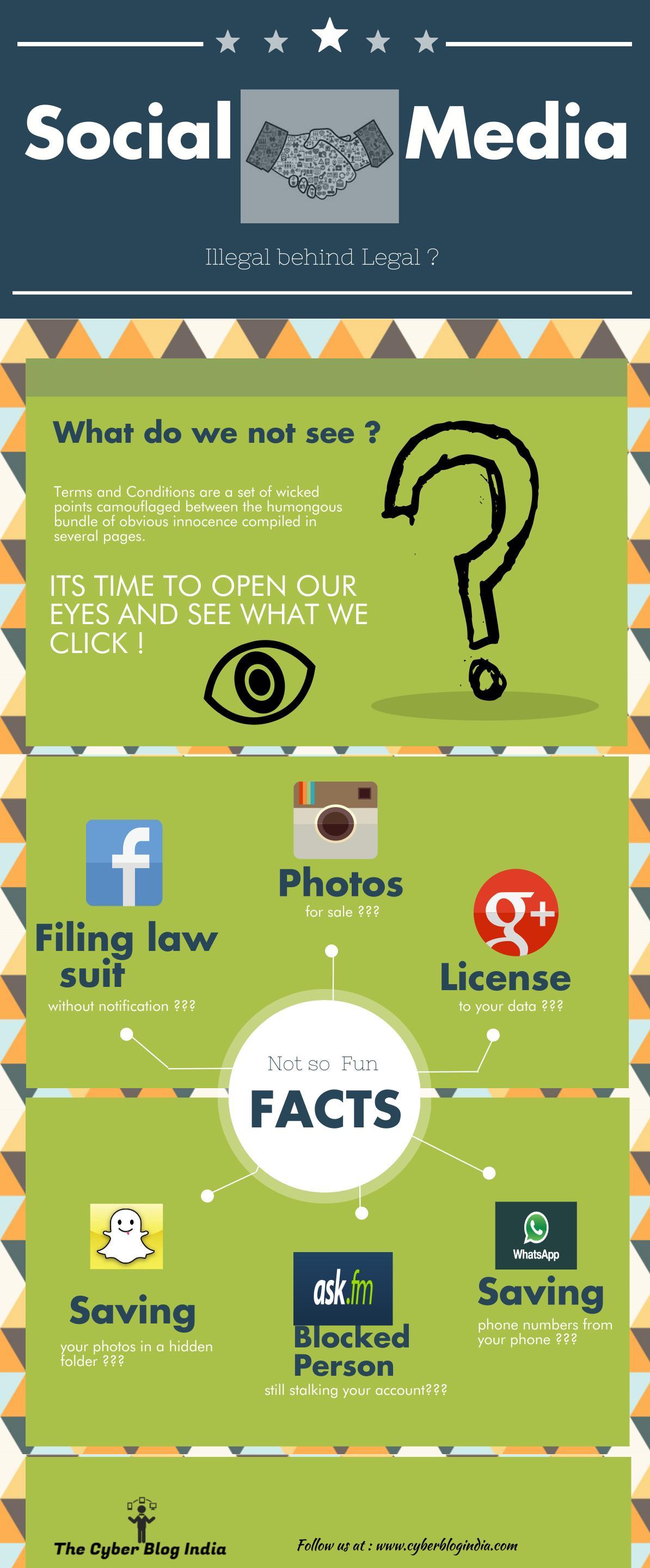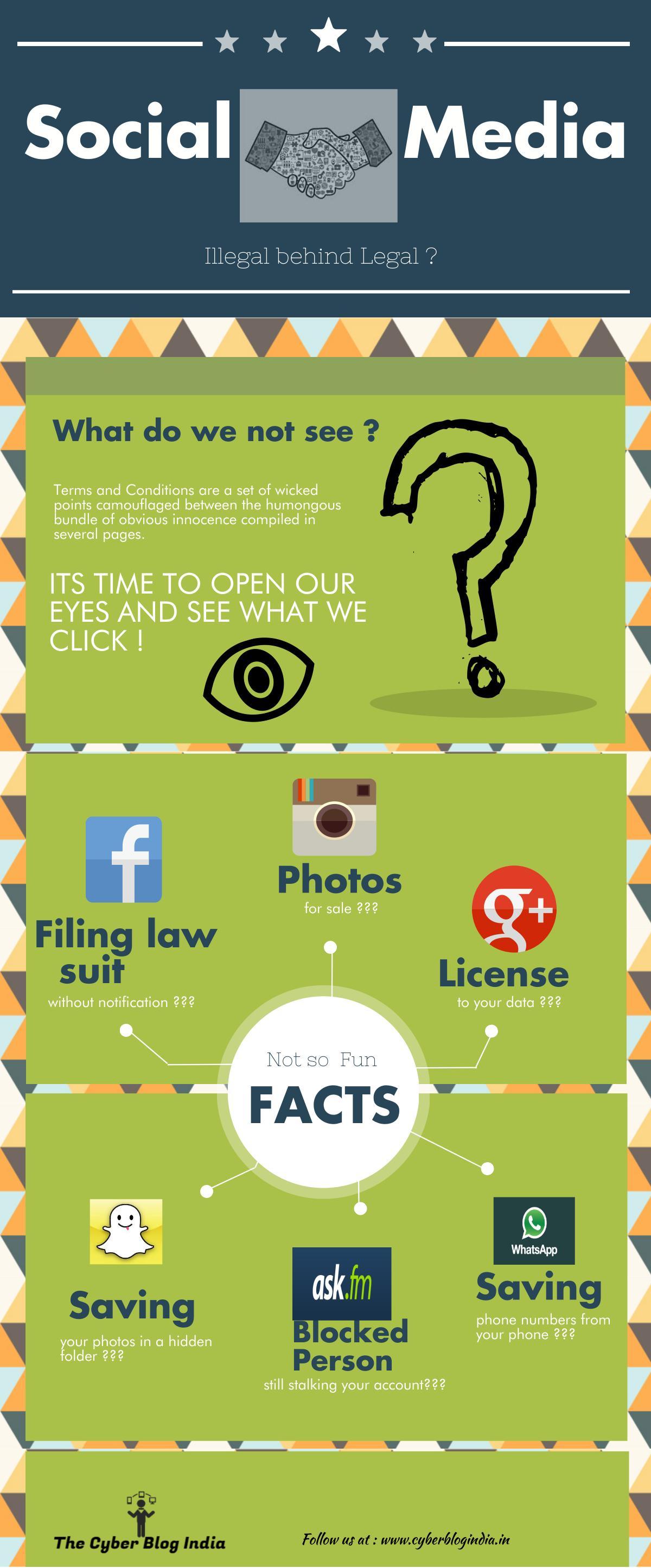Social Media : Illegal behind Legal ??

Social Media : Illegal behind Legal ??
We all are a bunch of lazy lads. The truth is installing a software is a sequence of click on the “continue”, “I accept” and “Install” button. Likewise we are so restless while registering for an app or so, we never take the pains of reading what are we actually accepting to by clicking on “I Agree.”
Via this blog let me just not say much but put in front of you certain facts, terms and conditions and acts of what goes behind the back when we actually accept those terms and conditions.
- Facebook has a non-exclusive, transferable, sub-licensable, royalty-free, worldwide license to use any content we post.
- Facebook can change its T&C without prior notification.
- Facebook can file lawsuit against any user without prior notification.
- Facebook can remove any post it wants.
- Only Facebook has the right to decide what is wrong or not.
- Companies Can Track Your Web Activities—Even After You Leave Their Site
- When you upload, submit, store, send or receive content to or through our Services, you give Google a worldwide license to use, host, store, reproduce, modify, create derivative works, communicate, publish, publicly perform, publicly display and distribute such content.
- Google is constantly changing and improving its Services. It may add or remove functionalities or features, and it may suspend or stop a Service altogether.
- Google may also stop providing Services to you, or add or create new limits to our Services at any time.
- The laws of California, U.S.A., excluding California’s conflict of laws rules, will apply to any disputes arising out of or relating to these terms or the Services. All claims arising out of or relating to these terms or the Services will be litigated exclusively in the federal or state courts of Santa Clara County, California, USA, and you and Google consent to personal jurisdiction in those courts
iTunes
- iTunes agreement is of 56 pages.
- The iTunes Service is available for individuals aged 13 years or older. If you are 13 years or older but under the age of 18, you should review this Agreement with your parent or guardian to make sure that you and your guardian understand it.
- Apple does not guarantee, represent, or warrant that your use of the iTunes Services will be Uninterrupted or Error-Free, And you agree that from time to time Apple may remove the iTunes Service for indefinite periods of time, or cancel the iTunes service at any time, without notice to you.
ASK.FM
- fm’s Terms of Service state, “Physical persons must be 13 years or older to use this service.” That’s right, tweens are not allowed on Ask.fm. Use this rule to your advantage, parents. You can say no, and the website backs you up, as does COPPA, the Children’s Online Privacy Protection Act, a federal law in the U.S.. (13 is the required age to have a Facebook and Twitter account, too.)
- No one monitors the content on Ask.fm. The website states, “The ask.fm service allows for anonymous content which ask.fm does not monitor. You agree to use the ask.fm service at your own risk and that ask.fm shall have no liability to you for content that you may find objectionable, obscene or in poor taste.”
- The website “is increasingly being used as a means to communicate abusive, bullying and sexualised content,” according to Webwise. It is “associated with some of the worst forms of cyberbullying” and has been linked to numerous suicides around the world, according to the Daily Mail.
- One user can block another user and must give a reason. Blocking someone, however, does not mean that they go away. A blocked person can still access the profile to view all other interactions.
- The site can be used anonymously, so users often have no way of knowing who is bullying or harassing them on the site.
- Users cannot increase privacy settings, as they can with the adjustable settings on Facebook and Twitter.
- fm is integrated with Facebook and Twitter – all these accounts can easily connect and what is posted on Ask.fm is easily shared and can appear on those other sites with next to no effort.
- Schools in Britain have advised students and parents to not usefm. Following the suicide of a 14 year-old girl in Britain who had been bullied on Ask.fm, British Prime Minister David Cameron said, “There’s something all of us can do as parents and as users of the internet and that is not to use some of these vile sites. Boycott them, don’t go there, don’t join them – we need to do that as well. I’m very keen we look at all the action we can take to try and stop future tragedies like this.”
- After Cameron called for changes at Ask.fm, the company issued a rather shocking statement. Founder Mark Terebin said, ‘We only have this situation in Ireland and the UK most of all. It seems that children are more cruel in these countries.’ One teenager over the summer received messages like “drink bleach”, “go get cancer” and “go die,” and those are quite similar to those seen in the United States.
- fm is based in Riga, Latvia, which is why U.S. and British authorities often have a long wait to gather data from the site. A user can disable his/her account, even if the password is forgotten. Kids have been known to tell parents that it is not possible. This is not true.
- WhatsApp is developed by California-based WhatsApp Inc.
- WhatsApp is appearing to be contravening international privacy law by accessing the users’ whole phone book. When smartphone owners install WhatsApp in their cellphones, the app immediately scans the contact book for numbers and to match WhatsApp accounts attached to those numbers. If any matches are found then those numbers are added into the WhatsApp profile. The users have no control over this process, so WhatsApp actually records both users’ and non-users’ number, and fails to delete the numbers of the non-users of WhatsApp which harms the privacy (except iPhone 5 because iOS 6 version of WhatsApp has the option to manually add contacts from the contact list). And that was found to be the contravening issue according to the International Privacy Law.
- In WhatApp’s privacy policy, they mentioned that they are going to access the contact list and scan and store the numbers. Below is a short section from WhatsApp’s privacy policy: You hereby give your express consent to WhatsApp to access your contact list and/or address book for mobile phone numbers in order to provide and use the Service. We do not collect names, addresses or e-mail addresses, just mobile phone numbers. When smartphone owners install WhatsApp in their cellphones, the app immediately scans the contact book for numbers and to match WhatsApp accounts attached to those numbers. If any matches are found then those numbers are added into the WhatsApp profile.
- In recent times a loophole was found in whatsapp security system that hackers can obtain users’ private chats with the aid of other Android applications.
Snapchat
- Snapchat is unique in that it claims the images exist only 10 seconds or less before “disappearing.” The fact that the images supposedly don’t live forever is what has propelled Snapchat to popularity, with 30 million messages a day.
- On May 8, 2014, Snapchat agreed to settle charges by the Federal Trade Commission (FTC) that it misled consumers, that messages do not disappear, that the company revealed users’ locations and that it collected more personal data that it indicated.
- The DaiLy Beast reports, “A digital forensics company discovered that the app actually saves the images to a hidden folder on the phone called RECEIVED_IMAGES_SNAPS. A file extension called ‘.NOMEDIA’ keeps the images from being viewed, but the Decipher Forensics team has found a way to take the files off the phone and change the extension, making them viewable again.”
- Decipher is currently charging $300 to $500 to extract the photos. The Daily Beast found that to be comforting, but I can see a collection being taken up in the junior high lunch room that reaches that figure pretty quickly if there’s something students really want to see.
Also
- Your Photos May Be For Sale (Instagram, Twitpic)
- You May Not Be Able To Delete Your Account Ever. (Skype, WordPress)
- Companies Can Track Your Web Activities—Even After You Leave Their Site (Facebook)
- Your Data Can Be Given to Law Enforcement Without Your Knowledge (Apple, Amazon, LinkedIn)
- You Could Be Banned from Filing Class Action Lawsuits (Sony PlayStation, Microsoft)
- Even If You ‘Delete’ a Piece of Content, the Company May Hold Onto It (Google, Twitter, Facebook)
- Whether the Terms Are Fair or Not, They Could Change At Any Moment (Yahoo)
Also check : 1.


